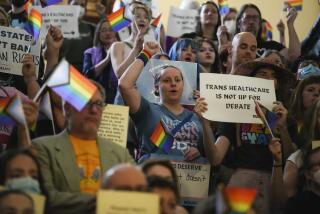Finally, Dignity and Respect -- but at Such a Cost
- Share via
In striking down a Texas law that made consensual sex in private between members of the same sex a criminal act, Justice Anthony M. Kennedy wrote that it “demeans the lives of homosexual persons ... entitled to respect for their private lives.” By emphasizing the word “respect,” Kennedy was not only upholding the right of privacy, he was asserting human dignity.
The ruling deserves the celebratory rallies being held throughout the country. But for some it will be difficult to feel grateful. That the matter came up is disgraceful to all concepts of decency. For gay veterans of not-too-distant wars for equal rights, the grand decision cannot help but stir memories of outrages survived.
Thirty years ago, incidents of violence against gay men were common, and it was almost always the gay man who was deemed guilty. Into the ‘70s, people risked arrest by being in a gay bar. A scurrilous Hollywood newspaper of the time frequently ran stories headlining the number of “queers” arrested in a bar. At any moment a bar would be flooded with light from a squad car. A bullhorn ordered all “queers” to march out in a single line, ostensibly to be checked for ID. The men would be insulted, mauled, in some instances beaten. Chosen arbitrarily, as many men as fitted into a squad car or wagon were taken to “headquarters for questioning.”
Protest would elicit a powerful threat: Anyone suspected of whatever the police claimed -- including loitering -- might be held, without charges, for 48 hours, released and then held again for as long.
Entrapment was rampant: A vice cop might court or accept an invitation for sex at someone’s home and then make an arrest. Plainclothes cops sat in cars outside gay gathering places in order to trail men leaving together. They waited, then pushed their way into private homes, just as -- significantly -- years later, the defendants in the Texas case, John Geddes Lawrence and Tyron Garner, would be arrested in Lawrence’s home.
Some men went to prison: A sentence of up to five years was possible.
It was illegal for members of the same sex to dance together (heterosexual women exempted). A “private” club in Topanga Canyon adopted a system of lights to signal a hostile presence. Lights would blink, and gay men would shift partners, dancing with lesbians. Fledgling political groups, like the Mattachine Society, met in secret, blinds drawn. Their newsletters were confiscated by the post office, although they had no erotic content.
Countless lives were destroyed by such arrests. Men lost their jobs, were ostracized, forced to register for life as “sex offenders,” mandated to stay away from any place catering to “perverts,” threatened with electric shock treatment. A man arrested in Twentynine Palms after a plainclothes cop struck up a conversation that led to a mutual agreement to go to a motel was sentenced to six months in jail, where he remained incommunicado. After he managed to get out -- the judge claiming he was “insane” and needed to be scrutinized -- he became a recluse, petrified for life by the incident.
In 1973, California finally repealed its anti-sodomy laws. But still, in 1977, driving home from UCLA in the early evening, I saw muggers fleeing from the man they had assaulted on the street. I drove the bleeding man to the police station so that a squad car would be sent to the area. The bruised man -- clearly gay -- was returning home with groceries when attacked. At the station, the sergeant studied him after I had recounted what I had seen, and asked him, “What did you try to do with those guys?”
Now, on the memorable day of June 25, 2003, in decent, moving words, Justice Kennedy and those who joined him in effect denounced those past horrors as inconsistent with the respect and dignity asserted. Many will rightly celebrate the decision as an unqualified victory -- and those who brought it about are heroic.
Without in any way belittling the decency of the justices in their brave opinion, some might view the decision as a vastly imperfect apology for the many lives devastated by cruel laws that made possible the myriad humiliations of gay people, the verbal assaults and screams of “faggot!” -- the muggings, the suicides, the murders -- all occurring even during this time of victory. The flagrant dissent by Justice Antonin Scalia and two of his colleagues -- in an effort to uphold the Texas law -- will help to keep fertile the atmosphere of hatred that allowed three men to mangle Trevor Broudy in West Hollywood and allowed Matthew Shepherd to be butchered in Wyoming.
And so the battles continue.
More to Read
Sign up for Essential California
The most important California stories and recommendations in your inbox every morning.
You may occasionally receive promotional content from the Los Angeles Times.










